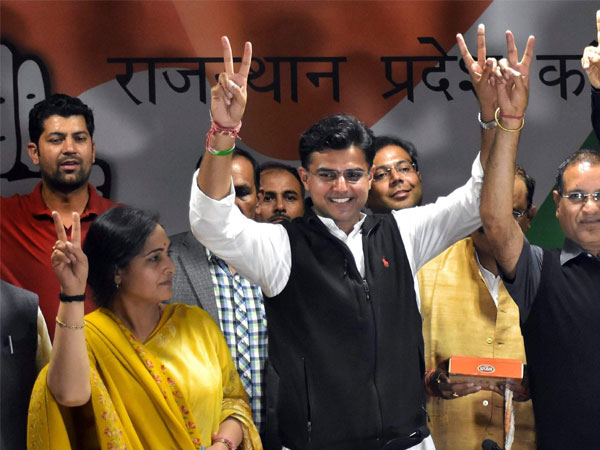
The Rajasthan bypoll results carry an unerring message -- that the BJP's claims for pushing an aggressive development agenda cannot proceed simultaneously with an unambiguous message of communal and caste polarisation. The price that the BJP has paid in the state, with an emphatic rebuke that it is time it mended its ways, comes against the background of the Gujarat assembly elections last year where its below par performance was chiefly caused by the same reasons as in Rajasthan: demonetisation and GST roll-out, caste conflict and the failure of the BJP governments in the two states to reconcile the communal differences.
That the BJP is on the defensive is evident. Finance Minister Arun Jaitley's insistence in his budget speech that the effects of remonetisation would be “transient” is an example. So, is the abundant caution with which it appears to be proceeding after the announcement on the path-breaking health insurance scheme aimed at reaching out to 50 crore Indians. That is a sign that it wants to prevent allegations that it is a ‘jumla’. Finance secretary Hasmukh Adhia said on Thursday that Modicare will take about six months to roll out. So, there won't be any runaway expectation -- like Rs 15 lakh being deposited in bank accounts of the poor.
Rajasthan chief minister Vasundhara Raje, who led her party to a massive victory in December 2013 when the BJP won 163 seats in the 200-member assembly, has possibly suffered for past mistakes. The problems over demonetisation and GST roll-out are recent and not of her own making, but the caste and communal problems in the state could be traced back to her. And they have a history.
In 2007, the state was consumed by caste violence over the competing claims of two powerful communities, the Gujjars and the Meenas, over reservation in government jobs. Raje had been chief minister at the time. The violence had gone out of hand, as the fire spread to BJP-ruled Madhya Pradesh. The priority for the Manmohan Singh government in the centre at the time as well as for the BJP leadership -- Rajnath Singh was BJP president and LK Advani, the party’s prime ministerial candidate in the 2009 Lok Sabha elections, headed the BJP parliamentary party — was to first end the violence. Little effort was made to get on top of the situation, and finding a solution through dialogues with the Gujjars was pushed back for later. That effort began when Raje became chief minister in 2013. However, there was no immediate solution.
For the record, the Rajasthan government had earlier designated the Gujjars as a special backward class and given them five per cent reservation. This had been struck down by the high court on the ground that it exceeded the 50 per cent upper limit for reservations set by the Supreme Court. In October last year, a bill was passed in the state assembly creating the most backward sub-category within the OBCs and giving the Gujjars five per cent reservation. Expectedly, the high court and the Supreme Court restrained the state government from implementing this because the quota limit would have crossed 50 per cent. Last month, the state government issued orders giving one per cent reservation to the 'most backward classes' comprising the Gujjars and four other nomadic communities, in the process keeping the quota limit below 50 per cent.
Anecdotal evidence from the ground says that the state government took a knock in the elections following the high court ruling, and for keeping the caste pot boiling for a long time. Add to this another caste issue -- the Rajputs and the release of Sanjay Leela Bhansali's ‘Padmaavat’ -- and the searing communal divide over cow vigilantism. Once again, it was a case of realpolitik gone wrong. The state government's soft pedalling on both issues, perhaps imagining this would have been an investment for the assembly elections scheduled for the year-end, has gone against it.
For Raje, this is not good news. The party was comprehensively trounced in all the three bypolls.
The results show failure of her administrative skills. To her detractors, despite her spirited campaign, the BJP has had to pay a price for her arrogance. This is a charge that she had to face back in 2007 as well, when protesters and partymen alike complained that she was not available to talk to them, choosing who she should meet. Lastly, she is not necessarily a big favourite of the BJP central leadership or the Sangh bosses in the same manner as some of the other BJP chief ministers, like Maharashtra's Devendra Fadnavis. Against that backdrop, the bypoll results should be good reason for her to watch over her shoulder.
ananda.majumdar@mydigitalfc.com


